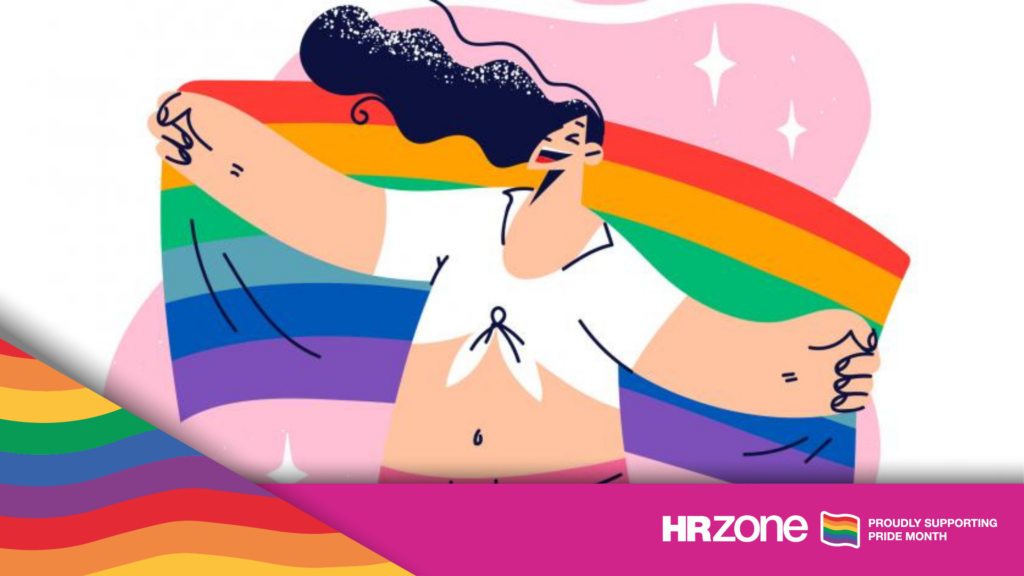As the alarm jolts me awake I fire up the news app on my phone and, as I scroll, my bleary eyes skim the headlines, and I am, once again, met with a fresh wave of disheartening stories – yet another attack on trans people.
Whether it’s the relentless debate about their access to changing rooms, their treatment in prisons, or the incessantly recurring, absurd query of whether women can have a penis or not, the discourse is filled with persistent discrimination.
Are these Pride declarations and rainbow logos truly reflective of a culture of belonging for trans people or just empty gestures of tokenistic inclusion?
A confusing dissonance
The glaring contrast of this harsh reality with my subsequent experience on LinkedIn is more jarring than the shrill tone of my morning alarm as I’m inundated by companies brandishing their rainbow logos and extolling their Pride month inclusion initiatives.
There is a disconnect, a yawning chasm between the embattled existence of trans individuals and the optimistic, even glossy, corporate narratives of inclusion and diversity.
This dissonance raises an unavoidable question.
Are these Pride declarations and rainbow logos truly reflective of a culture of belonging for trans people or just empty gestures of tokenistic inclusion?
There is a disconnect, a yawning chasm between the embattled existence of trans individuals and the optimistic, even glossy, corporate narratives of inclusion and diversity
A deteriorating climate
The social and political climate for the trans community in the UK has been progressively deteriorating, with limited legislative protections and sensationalist media amplifying existing prejudices.
According to some estimates, roughly 15% of the population hold gender-critical views, an alarming reality in stark contrast with the rosy pictures of corporate inclusivity painted on social media.
The social and political climate for the trans community in the UK has been progressively deteriorating
A disturbing disconnect
A recent survey by Totaljobs has highlighted that approximately 40% of trans and nonbinary employees are apprehensive about gender-critical views in the workplace.
This data points to a disturbing disconnect between the corporate rhetoric of diversity and inclusion and the lived experiences of many trans individuals.
As a trans woman, these headlines aren’t mere news stories to me; they echo my lived experiences.
Inclusion vs belonging
As we celebrate Pride, I can’t help but reflect on the difference between an ‘inclusive’ culture and a culture of ‘belonging’.
It’s the difference between being alone, a mere physical state, and being lonely, an emotional isolation.
Inclusion should mean more than simply inviting diverse individuals into our workplaces – it should mean valuing their contributions, actively including them in important conversations, and advocating for their rights.
Inclusion should mean more than simply inviting diverse individuals into our workplaces
Somewhere over the rainbow
It’s time for businesses to move beyond performative rainbow-washed logos and create an authentic culture of belonging that embraces all employees, particularly those who identify as trans or nonbinary.
You need to ensure that your policies and practices truly reflect your Pride declarations.
The true test of an inclusive culture is how safe and valued every employee feels, regardless of their gender identity.
Prioritise positive people experiences
As businesses, our commitment to diversity and inclusion shouldn’t just be about ticking boxes or a month-long celebration.
It should be about fostering positive people experiences, where everyone feels valued, respected, and, most importantly, that they belong.
We need to stand up against gender-critical views and provide unwavering support for our trans and nonbinary employees, not just during Pride month but throughout the year.
We need to facilitate meaningful, positive people experiences for all our employees.
The time is now to honour the true spirit of Pride by championing a culture of belonging that extends beyond a single month.
We need to stand up against gender-critical views and provide unwavering support for our trans and nonbinary employees
A brighter future
In doing so, we can work towards a more inclusive, accepting, and compassionate future for everyone.
Here are five immediate steps companies can take to support trans and nonbinary employees and foster a culture of belonging beyond simply ticking boxes:
1. Comprehensive gender diversity training: Implement regular training programs to educate employees about gender identities and the challenges nonbinary people face, debunking myths and addressing biases.
2. Policies and protection: Develop and enforce robust anti-discrimination policies that protect trans and nonbinary employees from prejudice and bias. Create a safe, confidential reporting system for any instances of discrimination or harassment.
3. Inclusive communication: Foster a respectful and inclusive communication culture. Respect the use of chosen names and pronouns and encourage the same across the organisation.
4. Support systems: Establish employee resource groups or affinity networks to provide support, resources, and advocacy for trans and nonbinary employees.
5. Leadership commitment: Leaders must actively show their commitment to inclusion, making clear that gender-critical views are not tolerated and that diversity and acceptance are fundamental company values.
Develop and enforce robust anti-discrimination policies that protect trans and nonbinary employees from prejudice and bias
Acceptance for all
As your businesses celebrate Pride month with rainbow logos and inclusion statements, I invite you to look beyond the paraphernalia and colourful symbols.
Look at the lives affected by your actions or lack thereof.
Look at your employees, like me, who need more than symbols – who need respect, safety, and a sense of belonging.
We are simply individuals seeking acceptance, yearning for authenticity, and striving for a world where we can exist without fear.
Look at your employees, like me, who need more than symbols – who need respect, safety, and a sense of belonging
Using power and position for good
I remain hopeful. I believe that change is possible, that understanding can be fostered, that acceptance can be nurtured.
We’re not just fighting for acceptance, we’re asking for the right to exist without fear, without judgement, without shame.
It’s time to use your power and position to bridge this gap between rhetoric and reality.
Let’s start now.
If you enjoyed this, read: Pride and Pronouns: Why they are so important in HR
[cm_form form_id=’cm_65a14c3f5da64′]







